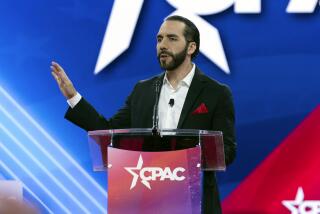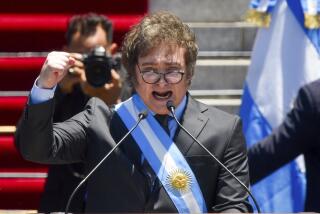Quayle Chides Castro but Fidel Gets Limelight
- Share via
BRASILIA, Brazil — Vice President Dan Quayle ignored Cuban President Fidel Castro on Thursday as they sat three seats apart at the inauguration of Brazilian President Fernando Collor de Mello, then chastised the Cuban leader by pointing out that “only one Latin American leader wore a military uniform” to the ceremony.
“The rest of the Latin American leaders were there because the people voted for them,” Quayle said at a news conference.
Quayle used Castro as a foil as he wound up a seven-day, six-nation visit to South America. But between the two, it was Castro who attracted the most attention. He was making his first visit to the Brazilian capital in nearly 30 years.
When Quayle arrived for the ceremony in the National Congress building, he had to squeeze past a crowd that had surrounded Castro. The vice president went virtually unnoticed, by comparison.
Throughout his tour, Quayle has portrayed Castro as an isolated figure while democratic elections have been held throughout the continent.
To that claim, Castro said in a Brazilian television interview: “I would say we were much more isolated in 1965 than we are now. We have close relations with the Third World . . . so I don’t believe you can talk about isolation resulting from problems that might occur in Eastern countries and the U.S.S.R.”
Quayle has made the movement toward democracy in South America the theme of his tour, which included his attendance at the inauguration in Chile on Sunday of Patricio Aylwin, who replaced Gen. Augusto Pinochet after 16 1/2 years of military rule. He also visited Venezuela, Paraguay, Argentina and Barbados.
“We stand firm for democracy. We went to see democracy come to Cuba. Many people in Cuba know which way the winds are blowing. They’re blowing toward democracy,” Quayle said.
The vice president conferred briefly with the new president of Brazil. He was said by his spokesman, David Beckwith, to have asked Collor to use Brazilian influence “to help democracy come to Cuba.”
For his part, Castro sought to project a more moderate approach than he has taken recently--even as he insisted that the reforms that have taken over the once-solidly Communist world of Eastern Europe would never be allowed to take root in Cuba.
Asked by a Brazilian television reporter if there were prospects for presidential elections in Cuba, Castro said: “In Cuba, there is no need for that type of elections. We have our own type of elections.”
Quayle had one more encounter with Nicaraguan President Daniel Ortega, after meeting him three times on Monday in Chile. He spent about 10 minutes with Ortega on Wednesday evening in Brasilia.
Beckwith said after the meeting that Ortega and two others at the meeting--Presidents Oscar Arias Sanchez of Costa Rica and Carlos Andres Perez of Venezuela--”were favorably disposed” toward a suggestion by the Bush Administration that U.N. peacekeeping forces be used to keep the hostile forces of the Sandinista army and Contra rebels apart in Nicaragua during the period of transition to the newly elected government of opposition leader Violeta Barrios de Chamorro.
However, Quayle was said to have expressed concern to Ortega about the process of the transition.
Ortega, in an interview with Brazilian television, reiterated his pledge, made to Quayle on Monday, that the Sandinista military would obey the orders of Chamorro when she takes office.
Quayle is to meet with a group of Contras in Washington today.
Times staff writer William R. Long contributed to this report.
More to Read
Sign up for Essential California
The most important California stories and recommendations in your inbox every morning.
You may occasionally receive promotional content from the Los Angeles Times.













